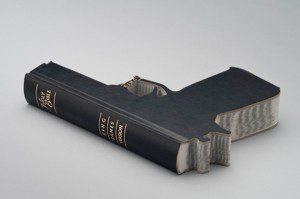The Evangelical Theological Society hosted a panel discussion on the book we discussed recently, Five White Guys Discuss the Hermeneutics of White People Five Views on Biblical Inerrancy. Peter Enns discusses that discussion, and summarizes his contribution to that book, which was constructively titled, “Inerrancy, However Defined, Does Not Describe What the Bible Does.”
If that seems a bit too theological or abstract, allow Gabriel Arana to make it more concrete and immediate in his excellent Prospect piece, “The Gay Awakening: While Christian leadership has held fast against the changing tide of public opinion on same-sex marriage, congregations have moved on without them.”
Arana offers an insightful look at the rapidly changing context that includes some insightful commentary from Robert Jones of the Public Religion Research Institute.
But in light of that earlier discussion of Five Views on Biblical Inerrancy, though, I want to correct one misimpression from Arana and Jones. Arana writes:
With the rift in the pews growing, the big question for religious institutions is whether the issue will lead to denominational splits as it did with slavery, which cleaved the Baptist Church and many other protestant denominations in two. A similar breakup occurred in the early 20th century over the doctrinal issue of Biblical inerrancy — the idea that the Bible contains the perfectly preserved word of God.
Almost. The rift over “inerrancy” was not a separate, “similar” fight. It was the same fight. It was a continuation of the very same debate as the earlier rift over slavery.

It was a clash over competing, incompatible hermeneutics — methods of reading and interpreting the Bible. The defenders of slavery developed a hermeneutic of selective literalism that allowed clobber texts to speak authoritatively as the absolute truth handed down by God. Abolitionists “read the same Bible and pray[ed] to the same God,” but they read that Bible differently. They employed a different hermeneutic. Their method of reading and interpreting the Bible stressed its internal diversity, emphasizing the any clobber texts must be understood within the larger context of the whole sweep of scripture, in which some teachings outweighed others that seemed — or were — in conflict with them.
Again, it’s a big honking lie to frame this as a debate between “conservative” inerrantists and their “liberal” detractors. The abolitionists were not introducing some innovative, new, modern approach to reading the Bible. They were reading it the same way that Christians had been reading it for centuries — the same way that conservative Christians had been reading it for centuries.
How about St. Augustine? He’s not usually dismissed as a “liberal,” and it would seem wildly anachronistic to call him some kind of “modernist.” But here is Augustine in On Christian Doctrine:
Whoever, then, thinks that he understands the Holy Scriptures, or any part of them, but puts such an interpretation upon them as does not tend to build up this twofold love of God and our neighbor, does not yet understand them as he ought.
That, in a nutshell, is the hermeneutic that the “liberal” abolitionists defended in opposition to the hermeneutic employed by the defenders of slavery. A generation later, this same argument over how to read the Bible was repeated, reframed as a defense of “inerrancy” rather than as a defense of slavery, but it was the same argument. The two sides were the same two sides and their positions were the same two positions.
And it is the same argument — with the same two sides staking out the same two positions — as the argument that Arana and Jones discuss under the rubric of “The Gay Awakening.”
In every iteration, the conflict is the same. On the one side are those who declare that they stand for the absolute truth of the inerrant scripture. And on the other side are those who say that such an appeal to scripture can never be contrary to the “twofold love of God and our neighbor.”
This is not a fight between “conservatives” and “liberals.” Nor, as the defenders of slavery/inerrancy/”traditional marriage” self-servingly claim, is this a fight between those who believe in the Bible and those who do not. This is a perennial argument between one group which cites scripture to defend it’s interests and another that says No, you do not yet understand the Bible as you ought.












